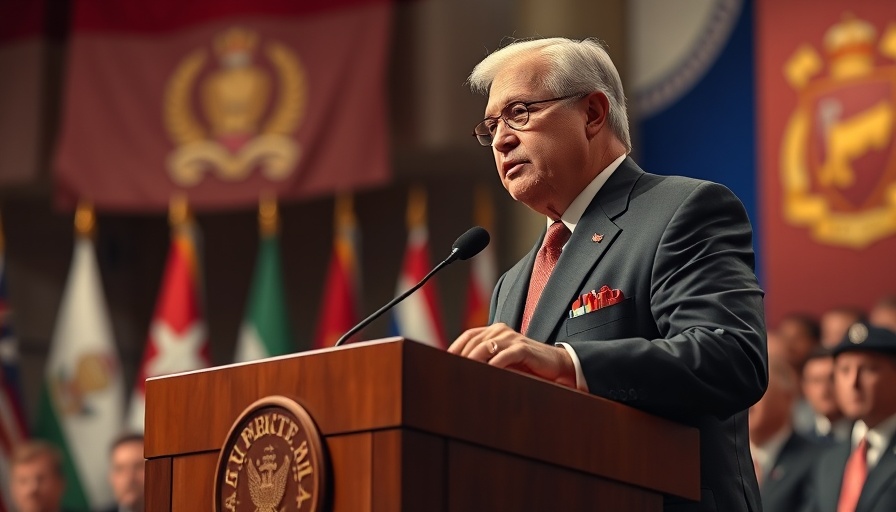
Trump's Authoritarian Rhetoric: A Threat to Press Freedom
In his recent declaration, President Donald Trump labeled two major news organizations—CNN and MSNBC—as "illegal," raising alarms among civil rights and legal professionals. Just 54 days into his second term, Trump positioned himself as "the chief law enforcement officer in our country," echoing language reminiscent of authoritarian regimes. This outburst came during a speech at the U.S. Department of Justice, an institution traditionally seen as independent from political influence, and marked a significant shift in Trump's approach to media.
Trump's remarks, which described the media as "political arms of the Democrat Party," drew heavy criticism for undermining the foundational tenet of press freedom. His statements suggested a dangerous intent, as he accused the media of influencing court proceedings and alleged without basis that their operations were illegal—a claim that contradicts the principles of a democratic society.
Historical Context: Press Freedom Under Fire
Historically, threats against the press are not new, especially during Trump's time in office. His pattern of labeling media outlets as "fake news" and calling journalists the "enemy of the people" stimulated a toxic environment for press freedom. Reporters Without Borders has reported a 50% increase in attacks against journalists in the U.S. in the lead-up to the most recent election cycle, underlining the severity of the situation.
Critics argue that Trump's authoritarian language is reminiscent of leaders like Vladimir Putin and Kim Jong Un, who have systematically targeted journalists and suppressed dissent. This contextual history is crucial for understanding the implications of Trump's rhetoric, which is perceived as a direct threat to the First Amendment rights of journalists and, by extension, the public's right to information.
The Implications for Press and Justice
The potential ramifications of Trump's hostile remarks extend far beyond just media relationships. Legal scholars and civil rights advocates express concern that such threats could inspire actions that undermine judicial independence and free expression. During his speech, Trump disparaged judges and prosecutors, fostering an environment where judicial intimidation could become commonplace.
Moreover, Trump's previous attempts to intimidate news agencies—such as threatening to revoke broadcast licenses—raise critical questions about the longevity of journalistic freedom. In light of reports of rising hate and violence against journalists, experts urge for protections against such attempts to quell dissenting voices.
What Legal Advocates Can Do: Taking Action Against Authoritarianism
For civil rights and immigration attorneys, this situation underscores the necessity of vigilance and action. Press freedom advocates recommend that lawyers work to uphold First Amendment rights as a way to challenge regressive policies. Joining organizations that push for press freedoms, such as the Committee to Protect Journalists, offers a pathway to combat these threats effectively.
Additionally, legal practitioners should consider challenging any actions that seek to intimidate or punish journalists under the guise of legal authority. Collective efforts can create a robust defense against any draconian measures.
Preparing for a Second Trump Term: Is There Hope?
While Trump's threats loom large, press freedom advocates remain hopeful due to the robust protections enshrined in the U.S. Constitution. The enduring power of the First Amendment is seen as a bulwark against attempts to silence critics. However, the recent trajectory of political rhetoric highlights the pressing need for renewed civic engagement and legal advocacy. Activists are mobilizing, urging the public to support legislation like the Press Act that seeks to protect journalists' rights and their ability to report freely.
Call to Action: Stand Up for Press Freedom
As reporters brace for the uncertainties ahead, civil rights attorneys must leverage their expertise to defend freedom of the press. Engaging with legal frameworks that support journalists, participating in advocacy, and raising public awareness is crucial in this battle. The integrity of our democracy depends on the ability of journalists to report without fear of reprisal.
Join the conversation. Support press freedom organizations and stay informed. Together, we can help safeguard the essential pillars of democracy.
 Add Row
Add Row  Add
Add 

 Add Row
Add Row  Add Element
Add Element 




Write A Comment